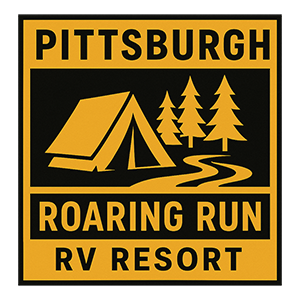Living full-time in an RV is already an adventure — but doing it during winter takes the experience to another level. Cold weather, snowy mornings, frozen landscapes, and peaceful campgrounds create a unique lifestyle that many RVers fall in love with. Others discover that winter full-timing brings challenges they never expected.
Whether you’re curious about making the leap or preparing for your first cold-season stay near Pittsburgh, here’s what winter RV full-timing really looks like: the good, the difficult, and the totally doable.
What Makes Winter Full-Timing Appealing
For many RVers, winter is the most peaceful time to stay in their rig. Campgrounds are quieter, roads are less crowded, and the scenery transforms into something magical. Frosted trees, gentle snowfall, and crisp mountain air make winter camping feel like stepping into a quieter world.
RVers who love the season say winter full-timing offers lower campground rates, cozy nights by the heater, less noise from neighbors, beautiful scenery, and a slower pace of life.
A warm, well-prepared RV becomes a comfortable refuge after exploring trails, scenic overlooks, and small Pennsylvania towns.
For more cold-season inspiration, see the RV Living in Winter Guide.
Why More People Are Choosing to Full-Time Through Winter
Winter RV living has grown in popularity for several reasons. Some retired RVers stay put longer to avoid constant traveling. Remote workers enjoy affordable month-to-month rates while working from scenic sites. Families want a quieter winter break. Full-time travelers prefer Pennsylvania’s four-season beauty, especially in areas near the Laurel Highlands and Western PA.
And for those staying at a year-round resort like Pittsburgh Roaring Run, winter living can feel surprisingly comfortable with the right setup.
The Challenges You’ll Face (and How to Handle Them)
While rewarding, winter full-timing brings challenges — but each one is manageable with preparation.
Keeping Your RV Warm
Maintaining heat becomes a daily task in cold climates. Electric space heaters help conserve propane, but the furnace remains essential to protect plumbing.
Cold floors, window drafts, and chilly mornings are common. Insulation, rugs, thermal curtains, and proper skirting make a huge difference.
For packing guidance, check the Winter RV Packing Checklist.
Protecting Your Water System
Water lines, tanks, and hoses freeze easily, especially overnight. Heated hoses, tank heating pads, and RV skirting prevent most issues. Many full-timers use their freshwater tank instead of staying hooked up to the spigot.
Storms can shut down dump stations temporarily. Planning your tank cycles around weather helps avoid problems.
Managing Moisture and Condensation
Warm air plus cold surfaces equals condensation — and full-timers experience this daily. Running a dehumidifier, venting during cooking, and keeping airflow steady help prevent mold and dampness.
Driving Less and Planning More
Most full-timers stay parked during winter months. After all, driving a large rig on snow or ice is stressful and unnecessary when monthly rates are affordable.
Energy and Propane Usage
Expect to use more electricity and propane in winter. Full-timers must budget for heating just like homeowners budget for utility bills. Some winter days require little heat, while others — especially during Pennsylvania’s single-digit nights — require running the furnace consistently.
What Winter Full-Time RV Life Actually Looks Like Day to Day
Full-timing in winter feels different from summer camping. The experience becomes more routine, cozy, and home-like.
Morning routines
Cold mornings mean:
- Turning on heaters
- Checking tank levels
- Inspecting water lines
- Clearing frost off stairs and hitches
- Making hot coffee to warm the RV
Sunlight through windows warms the interior pleasantly on clear winter days.
Afternoons
This is when most full-timers explore. Light winter hikes, scenic drives, and trips to town are common. Western Pennsylvania’s state parks — Ohiopyle, Moraine State Park, McConnells Mill — feel peaceful in winter.
Errands and propane refills are easier mid-day before temperatures drop.
Evenings
Once the sun sets, the RV becomes the cozy retreat. Most full-timers relax inside with warm blankets, electric fireplace glow, movies, reading, cooking hot meals, or chatting with neighbors staying through the season.
The stillness of a winter campground is one of the biggest draws of the lifestyle.
Do You Need Special Gear for Winter Full-Timing?
Yes — certain items make winter living comfortable instead of stressful.
Full-timers typically rely on thermal skirting, heated water hoses, tank heating pads, electric heaters, dehumidifiers, anti-condensation fans, snow shovels and ice scrapers, moisture absorbers, and battery-powered lanterns.
Even those living at winter-ready parks like Roaring Run benefit from extra insulation and redundant heating options.
Costs of Full-Timing in Winter
Many RVers assume winter is more expensive — but costs often balance out.
What tends to cost more:
- Propane
- Electricity (if metered)
- Heating accessories
- Occasional travel delays
What tends to cost less:
- Monthly campsite rates
- Fuel (less driving)
- Entertainment costs
- Crowded tourist areas
A detailed savings breakdown is available in your Monthly RV Park Rates in Pittsburgh article.
Pros of Winter Full-Time RV Living
Full-time RVers often mention these winter advantages:
Quiet Campgrounds – No crowds, no noise, peaceful stays.
Lower Rates – Monthly and seasonal stays are cheaper in winter.
Cozy, Home-Like Feel – Winter days feel slower and more intentional.
Beautiful Snowy Scenery – Frozen lakes, quiet forests, frosted mornings.
More Wildlife Sightings – Winter birds, deer, foxes, and owls.
Great for Remote Workers – Fewer distractions, stable routine.
Many RVers describe winter full-timing as more relaxing and meditative than summer living.
Cons of Winter Full-Time RV Living
There are challenges worth considering:
Cold Mornings – Heating takes time and energy.
Frozen Lines – Mistakes lead to freezing plumbing.
Limited Mobility – Most full-timers avoid traveling during storms.
Higher Utility Use – Propane and electricity play a larger role.
More Maintenance – Snow removal, condensation control, and skirting checks.
Despite these inconveniences, most full-timers say the benefits outweigh the drawbacks.
Is Winter Full-Timing Right for You?
Winter full-time RV living is ideal if you enjoy quiet environments, don’t mind colder weather, are comfortable staying parked longer, and want an affordable long-term lifestyle. It may be challenging if you dislike cold temperatures, prefer moving frequently, or own an RV not designed for winter use.
Still, with a few upgrades and the right heating setup, almost any modern RV can handle a Pennsylvania winter.
A Cozy, Slow-Paced Way to Live
Winter RV full-timing slows down the pace of life. Your RV becomes a relaxing, comfortable sanctuary, especially when snow falls outside your window and the campground grows quiet. Winter brings a unique charm that many full-time RVers come to appreciate deeply.
Why Many Full-Timers Choose Pittsburgh Roaring Run RV Resort
Full-timers staying at Roaring Run benefit from:
- Full hookups
- Plowed roads
- Spacious winter sites
- A safe, quiet environment
- Close access to scenic trails and towns
The resort makes winter living in Pennsylvania not only possible — but enjoyable.
Enjoy Full-Time Living All Winter Long
If you’re ready to embrace the beauty, comfort, and challenges of winter RV life, Pittsburgh Roaring Run RV Resort is the perfect place to call home. With the right setup, winter becomes one of the best seasons for RV living.
Stay warm, stay prepared, and enjoy the peaceful charm of Pennsylvania’s cold-weather months.


